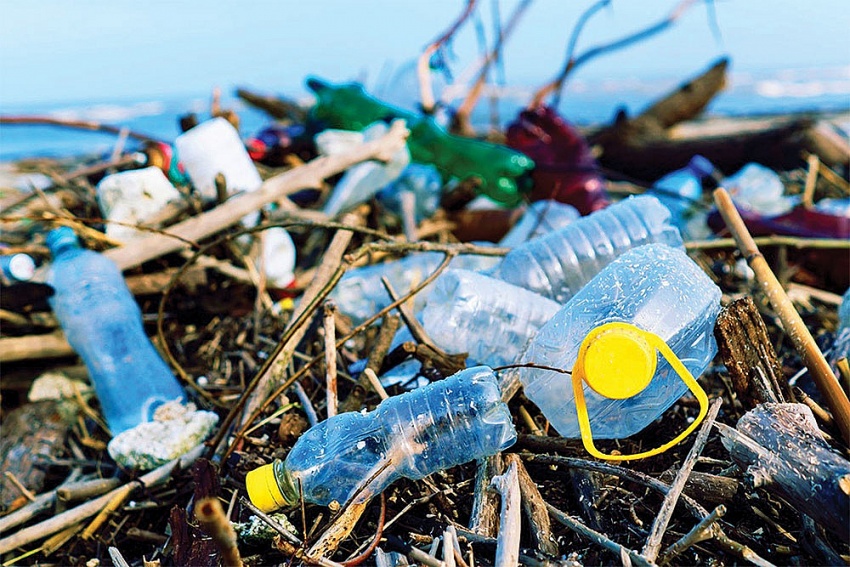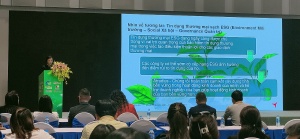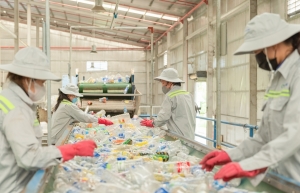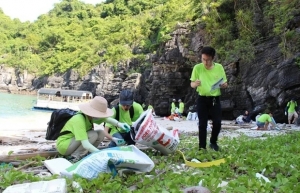Vietnam prepares for final negotiations on global plastics agreement
Final negotiations of the Intergovernmental Negotiating Committee (INC) that will take place in Busan to work towards an international treaty to end plastic pollution.
Le Ngoc Tuan, head of the Department of International Cooperation under the Ministry of Natural Resources and Environment (MoNRE) said, "The specific issues that need to be addressed include Vietnam's responsibilities in contributing to the solution of plastic pollution, both in terms of national obligations and voluntary commitments, as well as areas where international support is needed. The impacts of the global agreement on businesses, especially the plastics industry, will also need to be tackled."
 |
To prepare for the INC-5 negotiating session, the MoNRE has organised workshops and consultations with experts and businesses, particularly those in the plastics industry. The Vietnam Plastics Association and businesses related to the plastics industry have participated in these events to understand the opportunities arising from changing production models and product design criteria to better protect the environment.
At the end of July, at a workshop co-organised by the MoNRE and the United Nations Development Programme (UNDP) on the issue, UNDP deputy resident representative in Vietnam Patrick Haverman, said, "Achieving a global plastic agreement will provide an effective legal framework to gradually phase out hazardous chemicals in plastic products with clear timelines and targets. This will give industries the necessary time to prepare and transition to alternative solutions in a systematic and manageable way."
The INC negotiating session on crafting an international legally binding instrument on plastic pollution began its work in the second half of 2022, with the aim of completing the negotiations by the end of 2024.
So far, four INC meetings have been held, with the most recent one taking place in Ottawa, Canada. At an international meeting, Vietnam participated in negotiations to establish a cooperative, equitable framework for managing the plastics life-cycle, balancing international interests and environmental goals, and proposed providing technical, financial, and implementation support to developing countries to reduce plastic waste.
After the INC-4 workshop, Vietnam identified the need to assess the policy impacts based on trend forecasts, particularly regarding plastic pollution fees, which could require polymer producers to be responsible for the pollution costs of all the plastics they manufacture.
 | Financial stability key to green finance for plastics industry Foreign investors continue to eye the plastics industry in Vietnam, making it an enticing prospect for numerous merger and acquisition moves. The sector is prioritising the acquisition of more green investment to enhance its global competitiveness. |
 | Localities join in efforts to fight plastics pollution Ten localities in Vietnam are taking actions to fight plastic pollution under Plastic Smart Cities (PSC), an initiative put forward by the World Wide Fund for Nature (WWF). |
 | EPR can be a move towards sustainable development By implementing extended producer responsibility, Vietnamese businesses can meet the increasingly high demands of partners and participate extensively in the global value chain, but it is also a challenge because new regulations always take time to deploy and enforce effectively. |
 | UNEP helps monitor plastic pollution in Vietnam The Institute of Strategy and Policy on Natural Resources and Environment (ISPONRE) under the Ministry of Natural Resources and Environment and the United Nations Environment Programme (UNEP) are building steps to implement a project on enhancing the capacity of plastic pollution management in Vietnam. |
What the stars mean:
★ Poor ★ ★ Promising ★★★ Good ★★★★ Very good ★★★★★ Exceptional
Related Contents
Latest News
More News
- $100 million initiative launched to protect forests and boost rural incomes (January 30, 2026 | 15:18)
- Trung Nam-Sideros River consortium wins bid for LNG venture (January 30, 2026 | 11:16)
- Vietnam moves towards market-based fuel management with E10 rollout (January 30, 2026 | 11:10)
- Envision Energy, REE Group partner on 128MW wind projects (January 30, 2026 | 10:58)
- Vingroup consults on carbon credits for electric vehicle charging network (January 28, 2026 | 11:04)
- Bac Ai Pumped Storage Hydropower Plant to enter peak construction phase (January 27, 2026 | 08:00)
- ASEAN could scale up sustainable aviation fuel by 2050 (January 24, 2026 | 10:19)
- 64,000 hectares of sea allocated for offshore wind surveys (January 22, 2026 | 20:23)
- EVN secures financing for Quang Trach II LNG power plant (January 17, 2026 | 15:55)
- PC1 teams up with DENZAI on regional wind projects (January 16, 2026 | 21:18)

 Tag:
Tag:




















 Mobile Version
Mobile Version